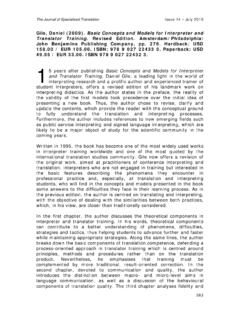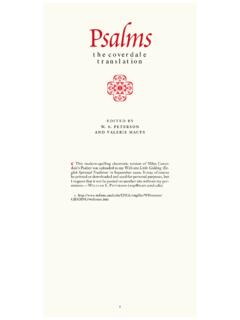Transcription of Walter Benjamin, 'The Task of the Translator'
1 1 Walter Benjamin, "The task of the translator " (introduction to a Baudelaire translation, 1923; this text translated by Harry Zohn, 1968) [This is taken from the anthology, The Translation Studies Reader, ed. Lawrence Venuti (London: Routledge, 2000).] 1. In the appreciation of a work of art or an art form, consideration of the receiver never proves fruitful. Not only is any reference to a certain public or its representatives misleading, but even the concept of an "ideal" receiver is detrimental in the theoretical consideration of art, since all it posits is the existence and nature of man as such. Art, in the same way, posits man's physical and spiritual existence, but in none of its works is it concerned with his response. No poem is intended for the reader, no picture for the beholder, no symphony for the listener.
2 2. Is a translation meant for readers who do not understand the original? This would seem to explain adequately the divergence of their standing in the realm of art. Moreover, it seems to be the only conceivable reason for saying "the same thing" repeatedly. For what does a literary work "say"? What does it communicate? It "tells very little to those who understand it. Its essential quality is not statement or the imparting of information -- hence, something inessential. This is the hallmark of bad translations. But do we not generally regard as the essential substance of a literary work what it contains in addition to information -- as even a poor translator will admit -- the unfathomable, the mysterious, the "poetic," something that a translator can reproduce only if he is also a poet?
3 This, actually, is the cause of another characteristic of inferior translation, which consequently we may define as the inaccurate transmission of an inessential content. This will be true whenever a translation undertakes to serve the reader. However, if it were intended for the reader, the same would have to apply to the original. If the original does not exist for the reader's sake, how could the translation be understood on the basis of this premise? 3. Translation is a mode. To comprehend it as mode one must go back to the original, for that contains the law governing the translation: its translatability. The question of whether a work is translatable has a dual meaning. Either: Will an adequate translator ever be found among the totality of its readers? Or, more pertinently: Does its nature lend itself to translation and, therefore, in view of the significance of the mode, call for it?
4 [..] 4. Translatability is an essential quality of certain works, which is not to say that it is essential that they be translated; it means rather that a specific significance inherent in the original manifest itself in its translatability. It is plausible that no translation, however good it may be, can have any significance as regards the original. Yet, by virtue of its translatability the original is closely connected with the translation; in fact, this connection is all the closer since it is no longer of importance to the original. We may call this connected a natural one, or, more specifically, a vital connection. Just as he manifestations of life are intimately connected with the phenomenon of life without being of importance to it, a translation issues from the original -- not so much for its life as from its afterlife.
5 For a translation comes later than the original, and since the important works of world literature never find their chosen translators at the time of their origin, their translation marks their stag of continues life. The idea of life and afterlife in works of art should be regarded with an entirely unmetaphorical objectivity. [..] The concept of life is given its due only if everything that has a history of its own, and is not merely the setting for history, is credited with life. In the final analysis, the range of life must be determined by history rather than by nature, least of all by such tenuous factors as sensation and soul. The philosopher's task consists in comprehending all 2 of natural life through the more encompassing life of history. And indeed, is not the continued life of works of art far easier to recognize than the continual life of animal species?
6 The history of the great works of art tells us about their antecedents, their realization in the age of the artist, their potentially eternal afterlife in succeeding generations. Where this last manifests itself, it is called fame. Translations that are more than transmissions of subject matter come into being when in the course of its survival a work has reached the age of its fame. Contrary, therefore, to the claims of bad translators, such translations do not so much serve the work as owe their existence to it. [..] 5. With this attempt at an explication [that languages "are not strangers to one another, but are, a priori and apart from all historical relationships, interrelated in what they want to express"] our study appears to rejoin, after futile detours, the traditional theory of translation.
7 If the kinship of languages is to be demonstrated by translations, how else can this be done but by conveying the form and meaning of the original as accurately as possible? To be sue, that theory would be hard put to define the nature of this accuracy and therefore could shed no light on what is important in a translation. Actually, however, the kinship of languages is brought out by a translation far more profoundly and clearly than in the superficial and indefinable similarity of two works of literature. To grasp the genuine relationship between an original and a translation requires an investigation analogous to the argumentation by which a critique of cognition would have to prove the impossibility of an image theory. There it is a matter of showing that in cognition there could be no objectivity, not even a claim to it, if it dealt with images of reality; here it can be demonstrated that no translation would be possible if in its ultimate essence it strove for likeness to the original.
8 For in its afterlife -- which could not be called that if it were not a transformation and a renewal of something living -- the original undergoes a change. Even words with fixed meaning can undergo a maturing process. The obvious tendency of a writer's literary style may in time wither away, only to give rise to immanent tendencies in the literary creation. What sounded fresh once may sound hackneyed later; what was once current may someday sound quaint. To seek the essence of such changes, as well as he equally constant changes in meaning, in the subjectivity of posterity rather than in the very life of language and its works, would mean -- even allowing for the crudest psychologism -- to confuse the root cause of a thing with its essence. More pertinently, it would mean denying, by an importance of thought, one of the most powerful and fruitful historical processes.
9 And eve3n if one tried to turn an author's last stroke of the pen into the coup de gr ce of is work, this still would not save that dead theory of translation. For just as the tenor and the significance of the great works of literature undergo a complete transformation over the centuries, the mother tongue of the translator is transformed as well. While a poet's words endure in his own language, even the greatest translation is destined to become part of the growth of its own language and eventually to be absorbed by its renewal. Translation is so far removed from being the sterile equation of two dead languages that of all literary forms it is the one charged with the special mission of watching over the maturing process of the original language and the birth pangs of its own. 6. [Benjamin talks about language 'kinship,' which to him is not a matter of likeness or identities of origin but in "intentionality.]
10 " Nonetheless, words from two different languages are not 'interchangeable.'] this, to be sure, is to admit that all translation is only a somewhat provisional way of coming to terms with the foreignness of languages. An instant and final rather than a temporary and provisional solution of this foreignness remains out of the reach of mankind; at any rate, it eludes any direct attempt. Indirectly, however, the growth of religions ripens the hidden seed into a higher development of language. Although translation, unlike art, cannot claim permanence for its products, its goal is undeniably a final, conclusive, decisive stage of all linguistic creation. In translation the original rises into a higher and purer linguistic air, as it were. In cannot live there permanently, to be sure. [.. 3.





